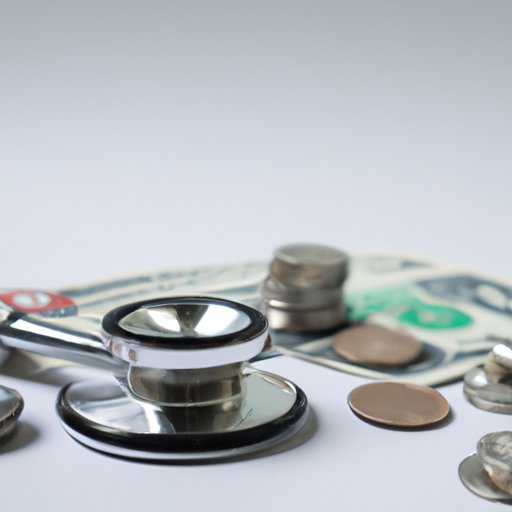Introduction
Having access to quality healthcare is essential to maintaining good health. Unfortunately, many people in the United States do not have health insurance due to a variety of factors, including cost and eligibility requirements. For those without insurance, the consequences can be severe, ranging from high out-of-pocket costs for medical services to difficulty paying bills and an increased risk of serious illness. This article will explore the potential risks associated with not having health insurance.
High Out-of-Pocket Costs
One of the most immediate consequences of not having health insurance is the cost of medical services. Without insurance, individuals must pay full price for any medical care they receive, which can quickly add up to thousands of dollars. According to a survey conducted by the Kaiser Family Foundation, the average cost of a doctor’s visit is $200, while the average cost of a three-day hospital stay is $30,000. Furthermore, tests and procedures can easily cost hundreds or even thousands of dollars.
For those without insurance, it can be difficult to pay for these services. Many people cannot afford to pay for medical care up front, and may be unable to take out a loan or use a credit card to cover the costs. As a result, they may be forced to forgo necessary treatment or delay seeking care until their condition worsens.
Limited Access to Quality Care
Another consequence of not having health insurance is limited access to quality care. Without insurance, individuals may find it difficult to find affordable care. Primary care physicians and specialists may only accept patients who are insured, or charge higher rates for those without insurance. In addition, many hospitals and clinics may require payment prior to providing services, making it difficult for those without insurance to receive care.
Furthermore, those without insurance may have difficulty finding specialists or obtaining specialized treatments. Specialists often require referrals from primary care physicians and may be more expensive than general practitioners. Additionally, certain treatments and medications may not be covered by public programs, leaving those without insurance to pay out of pocket.
Lack of Preventative Care
A lack of health insurance can also lead to a lack of preventative care. Regular checkups and tests are essential to detecting and preventing health problems before they become more serious. However, without insurance, individuals may not be able to afford these services, leading to an increase in the severity of illnesses and conditions. A study by the Centers for Disease Control and Prevention found that uninsured adults are less likely to receive preventative care than those with insurance.
In addition, without regular preventive care, individuals may experience unnecessary complications from their illnesses. For example, without regular checkups, an individual may not be aware of a potentially serious condition until it has progressed to a point where it requires more intensive and expensive treatments.
Difficulty Paying Medical Bills
For those without insurance, medical bills can quickly become overwhelming. Even after receiving care, individuals may be unable to pay the full amount due to the high cost of medical services. Unpaid medical bills can quickly accumulate and create a significant financial burden. Furthermore, if an individual is unable to pay their bills, they may be subject to legal action or collection agencies, further increasing their financial stress.
In addition, those without insurance may have difficulty finding payment assistance. Programs such as Medicaid and Medicare provide assistance to those who qualify, but individuals without insurance may not meet the eligibility requirements. As a result, they may be unable to obtain the financial help they need to pay their medical bills.

Higher Risk of Serious Illness
Those without health insurance are also at an increased risk of serious illness. Without access to preventive care and regular checkups, individuals may be unaware of underlying health issues until they become more severe. In addition, a lack of access to quality care can make it more difficult to treat illnesses and conditions effectively. A study by the American Journal of Public Health found that uninsured individuals are more likely to be diagnosed with advanced stage cancer than those with insurance.
Furthermore, the long-term health consequences of not having health insurance can be significant. Without access to preventive care and treatment, individuals may experience more serious and lasting health issues. These issues can have a profound impact on an individual’s quality of life and increase their risk of developing chronic illnesses.

Increased Financial Burden for Families
Finally, not having health insurance can have a significant impact on a family’s finances. The cost of medical services can quickly add up, placing a strain on household income. Furthermore, if medical bills remain unpaid, families may be forced to use their savings or sell assets in order to cover the costs. This can lead to a loss of income, savings, and other assets, making it even more difficult to pay for medical care.
Conclusion
Not having health insurance can have dire consequences, from high out-of-pocket costs for medical services to difficulty paying bills and an increased risk of serious illness. It is important for individuals to understand the potential risks associated with not having health insurance in order to make informed decisions about their health. Fortunately, there are resources available for those without insurance, such as Medicaid and state-funded health insurance programs, which can help make quality care more accessible and affordable.
(Note: Is this article not meeting your expectations? Do you have knowledge or insights to share? Unlock new opportunities and expand your reach by joining our authors team. Click Registration to join us and share your expertise with our readers.)
